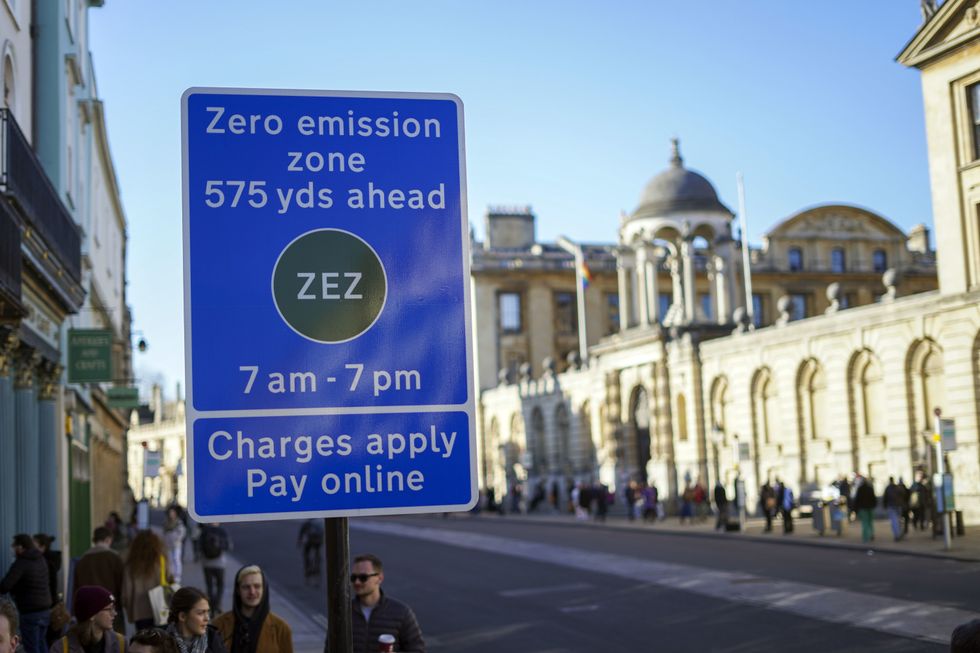Stockholm will make a decision on whether to extend the scheme in 2025
PA/GETTY
The scheme has been described as "more ultra" than London's Ultra Low Emission Zone
Don't Miss
Most Read
Trending on GB News
Stockholm is set to become the first major capital city to ban petrol and diesel cars from its city centre, with one expert questioning whether the same should be done in the UK.
The Swedish capital will only allow electric vehicles on the roads in some of the most popular parts of the city in a bid to cut pollution levels.
Lars Strömgren, Vice Mayor for Transport and Urban Environment of the City of Stockholm, took to X, formerly known as Twitter, to announce the news.
He highlighted how everyone in the city should be able to breathe clean air and that noise should not put people off from going outside.
WATCH NOW: Susan Hall on Ulez expansion
The traffic council officer said Stockholm’s plan was “more ultra” than the Ultra Low Emission Zone in London.
He added: “Instead, it should be a public festival with outdoor seating and plenty of space for walking and cycling.
“Now we are taking the next big step to make this a reality. I have announced today that in just over a year it will be prohibited to drive fossil-fuelled cars in a large part of Stockholm city.”
According to Air Quality News, petrol and diesel cars will be banned from Stockholm city centre to reduce pollution rates, with the new rules being introduced on December 31, 2024.
The scheme will cover around 20 blocks of the capital, including the finance district and main shopping district, with a further decision being made in January 2025 over whether the ban should extend further across Stockholm.
Sai Lakshmi, founder and CEO of Caura, spoke to GB News, saying: “The UK was at the forefront of implementing the Congestion Charge Zone in 2003 and subsequent Low Emissions Zones.
“Today, we have a range of options - determined by local councils - based on each area's specific emissions priorities.
“London has the expanded Ultra Low Emission Zone and the Congestion Charge, while Oxford has a similar Zero Emission Zone that imposes charges on non-electric vehicles entering.”
Oxford’s Zero Emission Zone is one of the strictest charging schemes in the UK, with drivers only avoiding charges if they have a zero emission vehicle, like an electric car.
People with ultra-low emission vehicles are required to pay £2 a day, while Euro 4 petrol and Euro 6 diesel cars pay £4 a day. All other vehicles are charged £10 to drive.
The zone affects a number of roads in the city centre, with drivers being urged to walk or cycle, or use e-scooters and public transport.
Sai Lakshmi continued, saying: “In my opinion, motorists require stability, and our research indicates a high level of confusion regarding emissions zones and city charges.
“Given advancements in sustainable fuels and the ongoing transition to 100 per cent renewable electric energy for EVs, it would be unwise to abruptly ban petrol and diesel in major UK cities now.
“We should emphasise research, evaluation, and a comprehensive Plan for Drivers, with the aim of making driving as straightforward, accessible, environmentally responsible, and safe as possible.”
LATEST DEVELOPMENTS:

The Zero Emission Zone launched in 2022
PA
Four more Low Emission Zones are to begin enforcement next year, with Scottish cities cracking down on the use of polluting petrol and diesel vehicles.
Aberdeen, Dundee, Edinburgh and Glasgow will be charging the most polluting vehicles to drive inside city centres from May next year.








